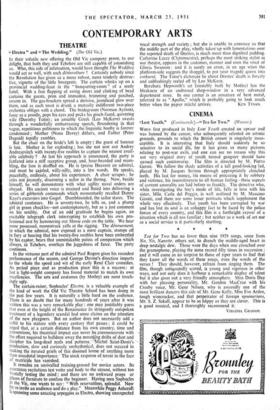CONTEMPORARY ARTS
THEATRE
"Electra" and "The Wedding." (The Old Vic.)
IN their volatile new offering the Old Vic company prove, to our delight, that both they and Tchehov. are still capable of astonishing us. Who, this side of infatuation, would have thought The Wedding would act so well, with such desinvolture '1 Certainly nobody since the Revolution has given us a more robust, more tenderly destruc- tive, vignette of the little bourgeois. The curtain whisks up on a provincial wedding-feast in the " banqueting-room " of a seedy hotel. With a free flapping of swing doors and clinking of bead curtains the guests, prim and immodest, brimming and parched, swarm in. The gas-brackets spread a derisive, jaundiced glow over them, and as each toast is drunk a mutually indifferent two-piece orchestra obliges with a chord. The bridegroom (Norman Ayrton), fussy as a poodle, pops his eyes and pecks his pinch-faced, quivering wife (Dorothy Tutin) ; an amiable Greek (Leo McKern) sweats through a wonderfully embarrassing speech, floundering in that vague, repetitious politeness to which the linguistic booby is forever condemned ; Mother (Nuna Davey) dithers, and Father (Peter Duguid) tepidly rambles. But the chair on the bride's left is empty; the guest of honour is late. Mother is for exploding ; has she not sent out Andrey Andreyevitch with twenty-five roubles to capture the nearest avail- able celebrity ? At last his approach is announced, the party is fanfared into a stiff receptive group, and, hoar-bearded and mum- bling, the lion is shuffled on. He is (praise Heaven) an admiral, and must be cajoled, willy-nilly, into a few words. He speaks, peacefully, endlessly, about his experiences. A chair scrapes ; he cries out joyously, discerning a sailor in the throng. Now, beside himself, he will demonstrate with what agility naval orders are obeyed. His ancient voice is strained and fluted into delivering a series of gibberish commands which momentarily recalled Danny Kaye's excursion into Gogol. Dumbfounded, the sailor stares. The admiral continues. He is seventy-two, he tells us, and a plump girl in green chuckles—not contemptuously, but as a just comment on his senility. Out of an odd gratitude he begins again, an excitable telegraph clerk interrupting to establish his own pro- fessional zest by hammering out Morse code on the table. We hear more possessed, moonstruck yells at the rigging. The denouement, in which the admiral, now exposed as a mere captain, stumps off in fury at hearing that his twenty-five roubles have been embezzled by his captor, bears that unmistakable patina of compassion which always, in Tchehov, overlays the jaggedness of farce. The party continues.
In the virtuoso part of the admiral Paul Rogers gives his roundest performance of the season, and George Devine's direction imparts to the whole the speed and wit of the early Rene Clair comedies. As period piece and as production piece this is a success: at last a light-weight company has found material to match its own excellencies. The sets and costumes (by Motley) are most touch- ingly ugly.
The curtain-raiser, Sophocles' Electra, is a valuable example of the kind of work the Old Vic Theatre School has been doing in the past few years. It is naturally a little hard on the audience. There is no doubt that for many hundreds of years after it was written this was a very remarkable play ; one may justifiably guess that even at the height of the Renaissance its stringently outspoken treatment of a legendary scandal had some claims on the attention of the new playgoers. But an author does not necessarily add a cubit to his stature with every century that passes ; it could be urged that, at a certain distance from his own country, time and conventions, his theatrical impact can never bs,commensurate with the effort required to bulldoze away the mounhng drifts of dust and decipher his long-dead zeals and patterns.""Michel Saint-Denis's production, slow and curiously unrhythmical, does not succeed in making the iterated griefs of this doomed house of anything more than anecdotal importance.- The stock response of terror in the face of matricide has vanished.
It remains an unrivalled training-ground for novice actors. Its enormous recitations test voice and body to the utmost, without too brutally testing the mind ; and there are no awkward props or pieces of furniture to confuse the beginner. Having seen Sophocles at the Vic, one wants to say: " With reservations, splendid. Now let us invite an audience and do a play." Meanwhile Peggy Ashcroft Is spanning some amazing arpeggios as Electra. showing unsuspected vocal strength and variety ; but she is unable to convince us that the middle part of the play, wholly taken' up with lamentations over the reported death of Orestes, is much more than dignified padding. Catherine Lacey (Clytemnestra), perhaps the most striking stylist in our theatre, appears in the costumes, manner and even the voice of Gloria Swanson: and it is surely an error, in an age when the platform-sole suggests the shopgirl, to put your tragedy queen into cothurni. The Tutor's elaborate lie about Orestes' death is fiercely and unblushingly reeled off by Leo McKern. Barabara Hepworth's set (unstably built by Motley) has the bleakness of an undressed shop-window in a very advanced department store. In one corner is an armature of bent metal, referred to as " Apollo," which is probably going to look much better when the papier mfiche arrives. KEN TYNAN.


































 Previous page
Previous page